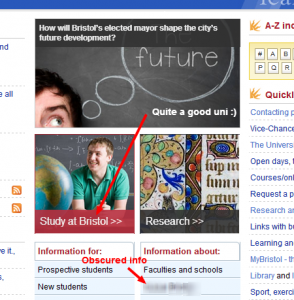By Jilly Broderick
The Graduate School of Education at the University of Bristol host many events but I was pleased to be able to attend a talk by Josie Fraser, ICT Strategy Leader for Children’s Capital at Leicester City Council, about the Building Schools for the Future (BSF) project.
The BSF project involved schools where approaches to teaching and learning are substantially different to those in Higher Education. However some key lessons learned by the project so far are relevant to any institution using technology enhanced learning, including the University of Bristol:
- Prioritising digital literacy for staff and students is key to maximising the usefulness of technology enhanced learning
- Learners’ perceptions of what constitutes effective use of learning technologies are not what we might expect: students want technology that works, not ‘cutting edge’ technology, in education
- The most important element of technology enhanced learning is to enhance, rather than replace, the face to face learning experience; therefore effective pedagogical approaches are crucial
- Open access resources and active staff collaboration are key to supporting innovative development of technology enhanced learning practices
With a high proportion of young people in the local population (27% are under 19) and over a third of these living in poverty, education potentially has much to offer Leicester. To effectively target these young learners the BSF project draws on collaboration with local providers of lifelong learning, a sector which has embraced new technologies for their capacity to reach and engage adults in the community, and the opinions of local young people regarding the ways in which different technologies should be prioritised in education.
The findings of the latter mirror the trends of Bristol’s (2012) Mobile Survey, and other similar research: perhaps surprisingly, young people are less interested in being provided with high-tech devices to use for their studies and more interested in simpler technology ‘that works’. The main areas identified in the research preceding the BSF were
- Improving infrastructure, including universal access to wifi in schools, and faster broadband connections
- Flexible access to PCs outside of scheduled classes and in non-ICT classes, for example through a bank of laptops which teachers could book and use anywhere
- More student-centred teaching using technology, including students having input into their schools’ internet policies, appropriate use of ICT in face to face teaching and the opportunity to collaborate with other learners across the world online
This evaluation prompted the BSF to focus on two main aspects of education technology:
- Prioritising digital literacy, for both staff and students: teaching learners how to select and use appropriate devices and tools needed to function in everyday society; including the use of relevant technologies, particularly social media platforms, to have an effective input into society. Tied in with building learner digital literacy is the aim of improving the effective staff use of ICT in everyday teaching
- Ensuring learners have equal access to the necessary tools and devices, both within and outside of school
The first aim, of improving digital literacy, has been addressed by improving ICT infrastructure in the schools; and where possible backing up fixed resources (computer rooms) with more flexible resource like banks of laptops which can be booked and used for any lesson in a school. A framework for understanding teachers’ perspectives on using ICT will provide regular checks on whether and how the attitudes and ideas of teaching staff change during the project: and how well it overcomes the well-documented teacher complaints of lack of confidence with learning technologies, concerns that they are over-complicated, and failure to see the potential benefit.
To achieve the second aim the BSF project has found the bring your own device (BYOD) model to be the least costly and most effective solution. The school identifies the most appropriate (not necessarily the most expensive or advanced) devices, and brokers with suppliers to negotiate a subsidy and financing scheme. Where necessary, financial support can be offered to low-income families but take-up of this has been found to be low. Parents have so far been found to be happy with this model; particularly where an element of choice is also offered so that learners can use a device they feel best suits them. Two important considerations maximise the value gained from the BYOD model: firstly the use of learning technologies must be supported by appropriate pedagogy and teacher enthusiasm; and secondly the school must also provide a few ‘backup’ devices for students to use in the short term if necessary.
It is interesting that a similar study at the University of Bristol found students preferred to choose their own devices for learning. This might be due to the fact that older university students have had more opportunity to get used to using certain devices or technologies, and are perhaps more likely to have their own devices prior to arriving at university. However interesting comparisons can be drawn between the effective use of e-voting handsets issued to some students at the beginning of the year and the BYOD model: student ‘ownership’ of a clicker has facilitated some innovative practice in feedback and informal assessment at the University and it is quite possible that similar outcomes could be achieved through a BYOD scheme.
A skills-sharing programme for teaching staff across the city offers the opportunity for teachers to share their own innovations and gain inspiration from others. All resources created under the scheme are open access, and CC licenced: it is hoped that this will help spread innovation not only within and also beyond Leicester.
Project website: http://www.leicester.gov.uk/bsf.aspx
